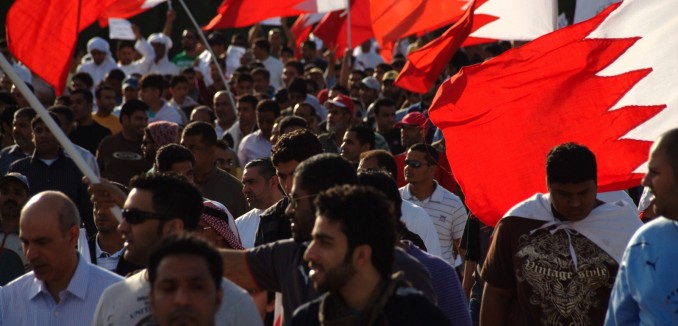The foreign ministry of the tiny Gulf kingdom of Bahrain condemned Iran’s “blatant interference” in its internal affairs. The statement made last week comes in response to remarks issued by the Iranian foreign ministry that condemned the December arrest of a Bahraini opposition leader.
The Bahraini foreign ministry called on Iran to “adhere to the principles of good neighbors and respect Bahrain’s national sovereignty and stop interfering in internal affairs.”
The issue of Iranian interference in Bahrain are long-standing: Despite its position across the Persian Gulf, Tehran claims sovereignty over the kingdom, calling it “Iran’s 14th province”. Hossein Shariatmadari, an influential Iranian newspaper editor and advisor to Iranian Supreme Leader Ayatollah Ali Khamenei, was even quoted by the newspaper Al-Watan as saying that Bahrain forms “part and parcel” of Iranian territory, but was separated by an “illicit settlement” during the reign of the deposed Shah. Shariatmadari also hinted that the Iranian Revolution is an example to be followed by Gulf states.
Officials in Manama, Bahrain’s capital, are worried that Iran will use its growing power in the Middle East to increase its momentum and gain a foothold in the kingdom. Fearing a duplication of the violence in Yemen where Iran-backed Shiite Houthis have taken control of many areas of the country, the Bahraini government clamped down in order to prevent a Shiite coup on its soil. Bahrain’s Interior Ministry on Saturday issued a statement saying that 72 people, many of them Shiite, were stripped of their nationality because they failed “in their allegiance duties towards the kingdom” and “harmed its interests.” Moreover, Bahraini courts have sentenced more than 200 activists to long-term prison sentences on charges of involvement in terrorist activities and acting against national security.
Indeed, there has seen an escalation of protests of the Shiite population in Bahrain over the past months. The protests intensified after the regime in December arrested Sheikh Ali Salman, a senior cleric and the leader of the main opposition party, al-Wifaq.
Bahrain also worries that Hezbollah, Iran’s proxy army in Lebanon, could help Iran gain a foothold in its territories. On January 9, Hezbollah leader Hassan Nasrallah blasted Bahrain over its crackdown on a Shiite-led uprising and its arrest of Salman. In addition, according to the Associated Press, Nasrallah “compared Bahrain to his archenemy Israel, saying it was naturalizing foreigners to make the Persian Gulf island increasingly less Shiite.” Nasrallah also issued a veiled threat to Bahrain, saying:
Weapons can be sent to the most secure countries. Fighters and gunmen can enter and small groups can sabotage a country. Hostile reaction swept the Arab world and Lebanon, where even some Shiites complained that threatening Bahrain could spur oil-rich Gulf nations to expel Lebanese Shiites from their soil.
The recent statements and developments are just the latest manifestations of turmoil in Bahrain, which has been rife with sectarian tensions for years.
Approximately three-quarters of Bahrain’s population is Shia, who are perceived to have ties with Iran. In contrast, the ruling Al-Khalifa family is Sunni and possesses strong ties to Saudi Arabia.
Given this sectarian divide within Bahrain, the tiny kingdom faces serious internal security challenges, which leave Bahrain open to the influence of other actors such as Iran. In his 2012 paper, “The Battle for Bahrain: Iranian-Saudi Rivalry,” Dr. Simon Mabon of the University of Leeds used Bahrain as a means to highlight the conflict between Saudi Arabia and Iran.
Indeed, within Bahrain, 70-75 percent of the population is Shia, who are perceived to have ties with Iran. In contrast, the ruling Al Khalifa family is Sunni and possesses strong ties to Saudi Arabia. Secondly, Bahrain’s geographic location provides opportunity to analyse geopolitical competition within the bilateral relationship.
Mabon explained further that “the Shia in Bahrain ‘have long been viewed as a potential Iranian fifth column — a legacy of the 1981 coup attempt by the Islamic Front for Liberation of Bahrain, an Iranian-backed Shia militant organisation.’ Given both the legacy of Iranian claims to Bahrain and the large Shia population within the kingdom, Ruhollah Khomeini’s desire to export the goals of the 1979 Islamic revolution across the region made Bahrain an obvious immediate target.”
Mabon also pointed that there are strong ties between Bahraini clerics and Iran. For example, Sheikh Isa Ahmad Qassem, the spiritual leader of al-Wifaq, is also a representative of Khamenei, collecting taxes for him and encouraging people to follow him.
[Photo: Al Jazeera English / Flickr]




